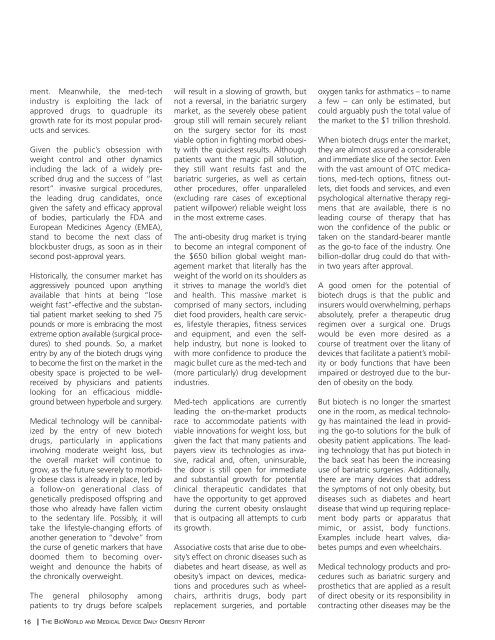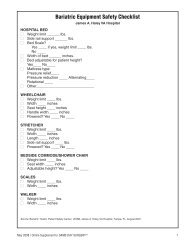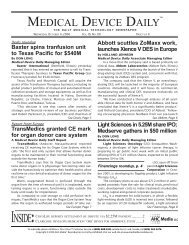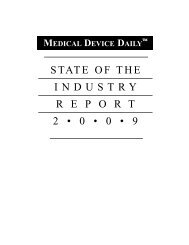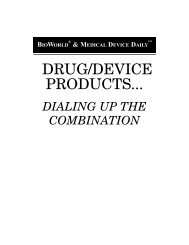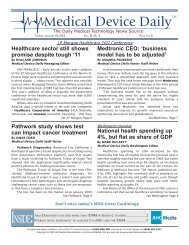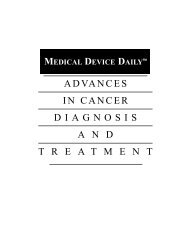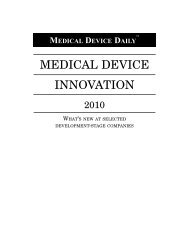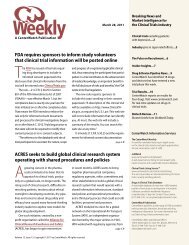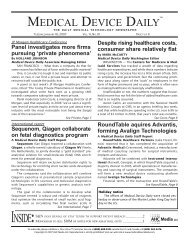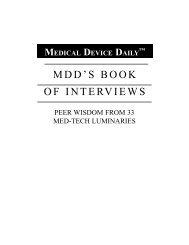Create successful ePaper yourself
Turn your PDF publications into a flip-book with our unique Google optimized e-Paper software.
16<br />
ment. Meanwhile, the med-tech<br />
industry is exploiting the lack of<br />
approved drugs to quadruple its<br />
growth rate for its most popular products<br />
and services.<br />
Given the public’s obsession with<br />
weight control and other dynamics<br />
including the lack of a widely prescribed<br />
drug and the success of “last<br />
resort” invasive surgical procedures,<br />
the leading drug candidates, once<br />
given the safety and efficacy approval<br />
of bodies, particularly the FDA and<br />
European Medicines Agency (EMEA),<br />
stand to become the next class of<br />
blockbuster drugs, as soon as in their<br />
second post-approval years.<br />
Historically, the consumer market has<br />
aggressively pounced upon anything<br />
available that hints at being “lose<br />
weight fast”-effective and the substantial<br />
patient market seeking to shed 75<br />
pounds or more is embracing the most<br />
extreme option available (surgical procedures)<br />
to shed pounds. So, a market<br />
entry by any of the biotech drugs vying<br />
to become the first on the market in the<br />
obesity space is projected to be wellreceived<br />
by physicians and patients<br />
looking for an efficacious middleground<br />
between hyperbole and surgery.<br />
<strong>Medical</strong> technology will be cannibalized<br />
by the entry of new biotech<br />
drugs, particularly in applications<br />
involving moderate weight loss, but<br />
the overall market will continue to<br />
grow, as the future severely to morbidly<br />
obese class is already in place, led by<br />
a follow-on generational class of<br />
genetically predisposed offspring and<br />
those who already have fallen victim<br />
to the sedentary life. Possibly, it will<br />
take the lifestyle-changing efforts of<br />
another generation to “devolve” from<br />
the curse of genetic markers that have<br />
doomed them to becoming overweight<br />
and denounce the habits of<br />
the chronically overweight.<br />
The general philosophy among<br />
patients to try drugs before scalpels<br />
THE BIOWORLD AND MEDICAL DEVICE DAILY OBESITY REPORT<br />
will result in a slowing of growth, but<br />
not a reversal, in the bariatric surgery<br />
market, as the severely obese patient<br />
group still will remain securely reliant<br />
on the surgery sector for its most<br />
viable option in fighting morbid obesity<br />
with the quickest results. Although<br />
patients want the magic pill solution,<br />
they still want results fast and the<br />
bariatric surgeries, as well as certain<br />
other procedures, offer unparalleled<br />
(excluding rare cases of exceptional<br />
patient willpower) reliable weight loss<br />
in the most extreme cases.<br />
The anti-obesity drug market is trying<br />
to become an integral component of<br />
the $650 billion global weight management<br />
market that literally has the<br />
weight of the world on its shoulders as<br />
it strives to manage the world’s diet<br />
and health. This massive market is<br />
comprised of many sectors, including<br />
diet food providers, health care services,<br />
lifestyle therapies, fitness services<br />
and equipment, and even the selfhelp<br />
industry, but none is looked to<br />
with more confidence to produce the<br />
magic bullet cure as the med-tech and<br />
(more particularly) drug development<br />
industries.<br />
Med-tech applications are currently<br />
leading the on-the-market products<br />
race to accommodate patients with<br />
viable innovations for weight loss, but<br />
given the fact that many patients and<br />
payers view its technologies as invasive,<br />
radical and, often, uninsurable,<br />
the door is still open for immediate<br />
and substantial growth for potential<br />
clinical therapeutic candidates that<br />
have the opportunity to get approved<br />
during the current obesity onslaught<br />
that is outpacing all attempts to curb<br />
its growth.<br />
Associative costs that arise due to obesity’s<br />
effect on chronic diseases such as<br />
diabetes and heart disease, as well as<br />
obesity’s impact on devices, medications<br />
and procedures such as wheelchairs,<br />
arthritis drugs, body part<br />
replacement surgeries, and portable<br />
oxygen tanks for asthmatics – to name<br />
a few – can only be estimated, but<br />
could arguably push the total value of<br />
the market to the $1 trillion threshold.<br />
When biotech drugs enter the market,<br />
they are almost assured a considerable<br />
and immediate slice of the sector. Even<br />
with the vast amount of OTC medications,<br />
med-tech options, fitness outlets,<br />
diet foods and services, and even<br />
psychological alternative therapy regimens<br />
that are available, there is no<br />
leading course of therapy that has<br />
won the confidence of the public or<br />
taken on the standard-bearer mantle<br />
as the go-to face of the industry. One<br />
billion-dollar drug could do that within<br />
two years after approval.<br />
A good omen for the potential of<br />
biotech drugs is that the public and<br />
insurers would overwhelming, perhaps<br />
absolutely, prefer a therapeutic drug<br />
regimen over a surgical one. Drugs<br />
would be even more desired as a<br />
course of treatment over the litany of<br />
devices that facilitate a patient’s mobility<br />
or body functions that have been<br />
impaired or destroyed due to the burden<br />
of obesity on the body.<br />
But biotech is no longer the smartest<br />
one in the room, as medical technology<br />
has maintained the lead in providing<br />
the go-to solutions for the bulk of<br />
obesity patient applications. The leading<br />
technology that has put biotech in<br />
the back seat has been the increasing<br />
use of bariatric surgeries. Additionally,<br />
there are many devices that address<br />
the symptoms of not only obesity, but<br />
diseases such as diabetes and heart<br />
disease that wind up requiring replacement<br />
body parts or apparatus that<br />
mimic, or assist, body functions.<br />
Examples include heart valves, diabetes<br />
pumps and even wheelchairs.<br />
<strong>Medical</strong> technology products and procedures<br />
such as bariatric surgery and<br />
prosthetics that are applied as a result<br />
of direct obesity or its responsibility in<br />
contracting other diseases may be the


